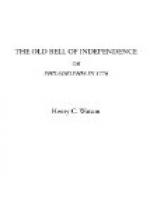“It was a horrible death,” remarked young Harmar. “Sykes, however, courted it by treachery to his countrymen.”
STORY OF THE SERMON.
“I believe this is the first time I’ve seen you since the disbanding of the army, Morton,” said Wilson. “Time has been rather severe on us both since that time.”
“Oh, we can’t complain,” replied Morton. “We can’t complain. I never grumble at my age.”
“Some men would have considered themselves fortunate to have seen what you have seen,” said young Harmar. “I think I could bear your years, to have your experience.”
“So do I,” added Mrs. Harmar. She always agreed with her husband in whatever he asserted.
“Let me see,” said old Harmar; “where did I first meet you, Higgins? Oh! wasn’t it just before the battle of Brandywine you joined the Pennsylvania line?”
“No,” answered Smith for Higgins, who, just then, was endeavoring to make up for his want of teeth by the vigorous exertions of his jaws. “He joined at the same time I did, before the battle of Germantown.”
“Yes, just before the battle of Germantown,” added Higgins. “I was not at Brandywine.”
“You wasn’t? Then you missed seeing us retreat,” said old Harraar. “But we did considerable fightin’, howsomever. Mad Anthony was there, and he used to fight, you know—at least the enemy thought so. I shall never forget the night before that battle.”
“Why?” asked Higgins. “Was you on the watch?”
“No, not on that account; something very different. There was a sermon preached on the evenin’ before that battle, such as can only be heard once.”
“A sermon?” enquired Wilson.
“Yes; a sermon preached for our side by the Rev. Joab Prout. I told my son there about it, and he wrote it into a beautiful sketch for one of the papers. He’s got a knack of words, and can tell about it much better than I can. Tell them about it, Jackson, just as you wrote it,” said old Harmar.
“Certainly,” replied young Harmar. “If I can recall it.”
“Do,” said Mrs. Harmer; and “Oh! do,” added the children; and Mr. Jackson Harmar did—as follows:—“All day long, on the tenth of September, 1777, both armies were in the vicinity of each other, and frequent and desperate skirmishes took place between advanced parties, without bringing on a general action. At length, as the day closed, both armies encamped within sight of each other, anxiously awaiting the morrow, to decide the fate of the devoted city.
“The Americans lay behind Chadd’s Ford, with the shallow waters of the Brandywine between them and their opponents; the line extending two miles along that stream.
“The sun was just sinking behind the dark hills of the west, gilding the fading heavens with an autumnal brightness, and shedding a lurid glare upon the already drooping and discolored foliage of the surrounding forests. It was an hour of solemn calm. The cool evening breezes stole softly through the air, as if unwilling to disturb the repose of all around. The crystal waters of the creek murmured gently in their narrow bed, and the national standard flapped lazily from the tall flag-staff on its banks.




